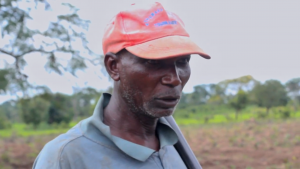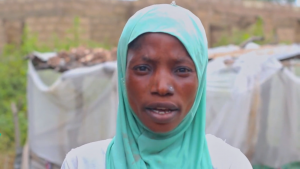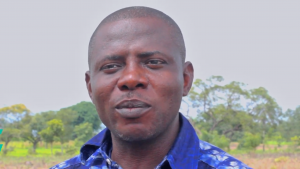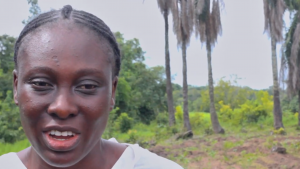In a recent series of interviews conducted on farmlands in Fufu, Ilorin South Local Government Area of Kwara State, farmers expressed deep concerns over the adverse effects of climate change on their agricultural activities. The interviews, featuring three male and two female farmers, shed light on the challenges faced during planting seasons and the noticeable shifts in weather patterns.
Mr. Zakariya Afeez , a seasoned farmer, lamented how unpredictable rainfall has disrupted the traditional planting calendar. ” I plant Maize, Cassava, cowpea but in recent times, i can no longer rely on the old patterns i used to follow. The rains are becoming erratic, affecting the timing of planting, and ultimately, harvests,” he stated.
According to Afeez , ” before now ,weather patterns were predictable and favorable but now sometimes when we get to the farm it is discouraging to see many of our plants are not doing well due to weather changes ‘”.
Alhaji Suleiman Malik , another farmer in the community, emphasized the changing weather conditions. “The heat has become unbearable at times, affecting the crops and making it difficult for us to work in the fields. We need sustainable solutions to cope with these changes,” he urged.

Suleiman Malik
For Malik who says he has been a crop farmer for over three decades now, ” the rains did not cease when it was expected and it did not start when we expected it, it’s a big inconsistent issue for farmers around here “.
Kuranga Azeez, a seasoned farmer with over 60 years of experience cultivating a diverse range of crops, including maize, beans, soya beans, and yams, shares a poignant perspective on the significant changes in harvest yields brought about by shifting climatic conditions.
Azeez, with a deep sense of nostalgia, remarked, “In my earlier years of farming, the predictability of seasons played a crucial role in determining the success of our crops. The rains were consistent, and we could plan our planting and harvesting accordingly.”

Kuranga Azeez
However, as he observed the evolving climate over the decades, Azeez expressed his concerns. “Now, everything has changed. The rains are not as dependable as they used to be. It’s affecting the growth and yield of my crops, especially maize and beans. The irregular patterns make it challenging to anticipate the right time for planting and harvesting.”
Azeez emphasized the impact on soya beans, a crop he has cultivated for many years. “Soya beans require a specific environment to thrive. With the unpredictable weather conditions, the yield has significantly decreased compared to the past.”
Reflecting on the broader implications, Azeez concluded, “Climate change is real, and it’s affecting us farmers directly. We need to adapt our methods, but we also need support and awareness. The younger generation needs to understand the changes we’ve witnessed over the years and work towards sustainable farming practices for the future.”
As the effects of climate change continue to unfold, two resilient female farmers in Fufu, Ilorin South Local Government Area of Kwara State, Afeez Hikmat and Ayinde Rasheedat planting crops like cassava, yams, and maize, also voiced their distress over the noticeable impact on their agricultural endeavors.

Ayinde Rasheedat
Afeez Hikmat, a dedicated maize farmer, shared her concerns, “The weather has become so unpredictable. Our maize crops, which used to thrive under certain conditions, are now suffering due to irregular rainfall. It’s affecting not just our livelihoods but also the local food supply.”
Ayinde Rasheedat , specializing in cassava and yam cultivation, expressed her worries about the changing climate. “Cassava and yams need a specific environment to flourish. With the unpredictable weather patterns, it’s becoming a challenge to maintain the quality and quantity of our harvests. Climate change is hitting us hard.”
Further insights were provided by two agricultural experts from Agricultural And Rural Management Training Institute (ARMTI) Nigeria, Mr. David Emmanuel and Mrs. Oyedele Dorcas.
They highlighted the pressing need for climate-smart agriculture practices to mitigate the impact of climate change.
David emphasized, “Farmers must adopt resilient techniques that can withstand the evolving climatic conditions. Awareness and education on these practices are crucial.”

David Emmanuel
According to him , ” if you ask a farmer , do you understand climate change ,farmers may not really understand what you are saying but what farmers really understand is variation in rainfall , reduction in yield ,farmers understand now that there is migration of insects that could increase disease infestation ,farmers understand some of the effects of climate change but the real concept of climate change ,they still find it hard to come to terms that some of these effect are as a result of Climate change.”
“Going forward, what we have done with the Farmers is to train them on the concept of climate change and effects of climate change in particular locations. This year, ARMTI has been a able to train farmers including provision of rainfall data which these farmers do not have access to before now, we gave them possible times of planting that will help them in production which has now helped to improve their productivity.”
David added that Farmers in the area and other locations are been trained on how to be climate smart which entails planting of good and early maturing seeds, resistant seeds to diseases noticed in given areas, referrals to highly improve seeds varieties, teaching of Agricultural practices that can help them Increase yield and the practice of organic farming.

Oyedele Dorcas
For Oyedele Dorcas, an agricultural expert from Agricultural And Rural Management Training Institute (ARMTI) Nigeria, ” there are now digital tools available for farmers to get the climate settings for their environment, there are some area that have early rainfall while others have a late rainfall so they can use these tools to identify their timing for planting.”
These interviews underscore the urgency for collaborative efforts between farmers, local authorities, and agricultural institutions to address the challenges posed by climate change in Fufu and beyond.
As the effects of climate change intensify, proactive measures become imperative for the sustainability of agriculture in the region.
Join our twitter community :


